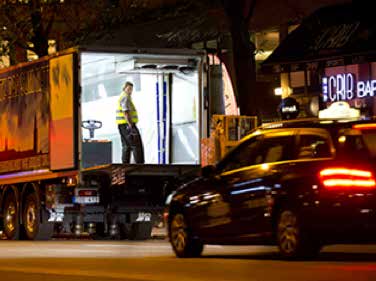Primer for Improved Urban Freight Mobility and Delivery
|
||
Key Accomplishments
|
The City of Stockholm, Sweden initiated an off-peak delivery pilot project in 2014 to better organize urban freight transport and reduce traffic congestion. The goals were threefold: 1) make deliveries more flexible; 2) urge transport companies to invest in newer, quieter, and more environmentally friendly trucks; and 3) increase efficiency for all transportation modes to improve the safety and livability of the city for its inhabitants. In addition, the city anticipated that off-peak deliveries could improve working conditions for drivers, since there would be less congestion, greater travel time reliability, and less anxiety.
The goal of voluntary off-peak or off-hour delivery programs is to reduce congestion and pollution from truck traffic by providing incentives to urban receivers to shift daytime deliveries to "off" hours. However, in Stockholm there are regulations prohibiting deliveries between the hours of 10:00 p.m. and 6:00 a.m. due to concerns about noise. To explore the benefits of lifting this ban, the Stockholm pilot permitted two companies to operate one vehicle each for off-hour deliveries. The project team tested nighttime distribution using a hybrid electric vehicle and a biogas vehicle for delivering goods to three retail establishments and to a variety of hotels and restaurants.

Off-peak delivery in downtown Stockholm, Sweden. Source: Stockholm Off-Peak City Logistics Project.
The results of the pilot suggested that off-peak deliveries could work well in the Stockholm region and a follow-up study is being considered. From the city's perspective, the most important remaining challenges are noise measurements, surveillance (e.g., permitted vehicles, fuel type, and emission levels), and additional costs of potential infrastructural changes.

One of the pilot vehicles traveling through Stockholm at night. Source: Stockholm Off-Peak City Logistics Project.
Although the City of Stockholm initiated the project and provided organizational support throughout the pilot, KTH Royal Institute of Technology actually managed the project. The pilot test occurred over a 2-year period from 2015 to 2016. The outcomes were analyzed for transport efficiency, environmental impacts of noise, and policy measures and stakeholders' perspectives.
Several different stakeholders made important contributions to the pilot. Two major producers of heavy trucks provided two state-of-the-art, environmentally-friendly distribution trucks. A company specializing in silent systems for distribution (e.g., rolling cages) provided the necessary equipment. Two of the biggest logistics companies in Sweden participated by delivering goods during nighttime hours to their customers. In addition, an international retail company operating in off-peak hours in other countries volunteered to test the model in Stockholm.
The study team found that the benefits of off-peak deliveries exceeded the costs.
Furthermore, all participants in the pilot were pleased with the improvements in freight mobility in downtown Stockholm. Given the small scale of the pilot, it is difficult to make broad conclusions about the potential benefits of more widespread application of off-peak deliveries. KTH Royal Institute of Technology is eager to conduct another pilot project to build off the success of the first pilot study.
Anna Pernestål Brenden, PhD, Researcher & Program Manager, Integrated Transport Research Lab at KTH Royal Institute of Technology, +46 8 790 7324, pernestal@kth.se
|
United States Department of Transportation - Federal Highway Administration |
||